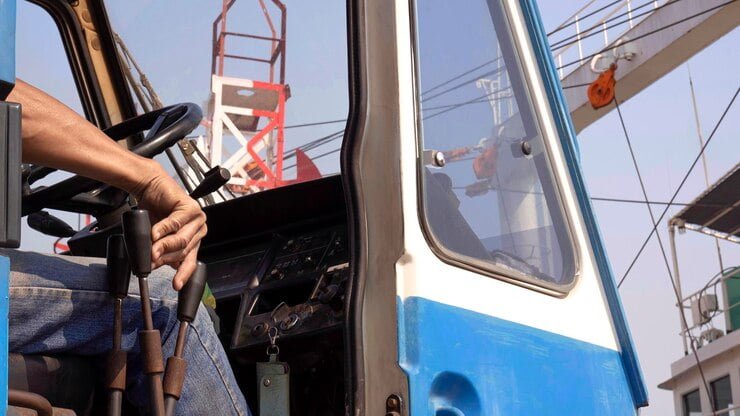Who Are the People Behind All Freight Operations: Get To Know Them
by Arnab Dey Business Published on: 19 April 2022 Last Updated on: 21 October 2024

Freight operations are essential to the economy and significantly impact global trade. Who are the people behind all freight operations?
What is their job title, and what do they do? This article provides an overview of the people working in freight operations, focusing on how they contribute to the global economy.
What Do They Do?
Although people may think freight operations only occur while loading and unloading a ship, truck, train, or plane, there are several steps. The shipping and transport industry is a massive industry that has many different functions.
Everyone involved in the shipping and transport industry plays a vital role. From port truck drivers to production planners, they handle it all.
Freight operations include all steps between the time a shipment is tendered by the shipper and when it is delivered to the consignee. There are numerous intermediate steps, such as transportation, packaging, and customs.
A significant group of people that most people don’t realize are part of freight operations includes the people at the ports and terminals. These people ensure all documented requirements have been completed.
They are responsible for unloading the shipments, whether by truck, train, or boat, and loading the freight, which includes any processes.
People Involved in Freight Operations
Freight operations support all facets of our economy, from goods to be shipped to and from companies to goods transported from one part of the world.
Freight operations consist of several factors, all of which play a role in delivering goods on time and in the most cost-effective way. Also, freight operations are necessary to ensure goods are delivered safely.
The People Who Work In Freight Operations Can Be Grouped Into The Following:
1. Operations Managers
These are the people behind the scenes with the responsibility of managing the company’s operational activities.
Operations Managers oversee the company’s daily operations, including being responsible for the safety and security of the transported goods. It inspects vehicles and equipment to ensure they meet all safety and security standards.
Operations Managers are also responsible for establishing and enforcing safety and security protocols for the company, such as safety rules and regulations, emergency response procedures, and security measures.
Operations Managers are also responsible for meeting all regulatory and legal requirements for the company and its subsidiary companies.
This includes compliance with the Federal Motor Carrier Safety Administration (FMCSA), US Department of Transportation (USDOT), Occupational Safety and Health Administration (OSHA), and Environmental Protection Agency (EPA).
Operations Managers are often responsible for managing the company’s employees, including hiring, firing, promoting, and disciplining.
In the context of freight operations, operations managers manage the activities of the carrier operations, the last stage of the freight operations process.
2. Freight Analysts
These are the people who are responsible for completing the math behind all freight operations. They work “behind the scenes” to ensure freight operations run smoothly.
Freight Analysts are responsible for calculating the costs of all freight operations. This involves calculating costs per shipment, per weight, per volume, or any other measurement basis and preparing balance sheets, cost-profit analysis, and other documents.
Freight Analysts calculate the costs of the shipments and compare them to the budget to ensure the budget is being met and to ensure the company is making a profit. A profit is needed for the company to continue operations and provide for its employees.
Freight planners are responsible for establishing freight networks, which is achieved through logistics planning. Logistics planning is a term used throughout the shipping and transport industry and is sometimes called demand planning.
Freight planners are responsible for coordinating the flow of goods and services to meet the needs of the customer and the needs of the shipping and transportation industry.
Freight planners are also responsible for ensuring all rules and regulations are being met and are often responsible for training all shipping and transportation industry employees. This can include truck drivers, rail workers, ship workers, and other transportation industry careers.
3. Freight Forwarders
Freight forwarders are responsible for taking the shipment from the shipper and making sure it arrives at the consignee within the specified time frame.
Freight Forwarders make sure the shipment meets all regulatory and legal requirements of the shipping and transport industry.
Freight forwarders also receive, examine, and issue documents for the shipment. This involves making sure the documents are in proper order and are correct.
This consists in reviewing the bill of lading, airway bill, waybill, and any other type of document associated with the shipment.
Freight forwarders are also responsible for ensuring the shipment arrives at the specified time. This includes any pick-ups from the shipper and any drop-offs at the consignee.
For instance, Zggship freight forwarder from China is guaranteed that goods from their customers are delivered within the schedule.
The Freight Forwarder’s main objective is to provide customized solutions to their customers’ transportation needs. These solutions are based on the specific needs of their customers.
Also, freight forwarders offer air, ocean, road, and rail freight forwarding services. FBABEE for instance, a 3PL freight forwarder offers customized solutions to their customer’s needs.
Freight Forwarding usually involves shipping containers. Because of the size of the containers, freight forwarding can be a bit more complicated than it seems.
Containers require special equipment to transport them, as well as particular procedures. These specialized containers are used to transport various goods from country to country.
4. Freight Agents
Freight agents are the people who work on the ground at the ports and terminals, making sure the shipments are being loaded onto the correct trucks, trains, or ships.
Freight agents are also responsible for showing the driver the route from the shipper to the consignee most efficiently and cost-effectively.
Freight agents are also responsible for checking up on the shipment to ensure it arrived at the consignee in its condition when it left the shipper.
Freight agents are also responsible for meeting all safety and security standards for the shipment. This includes making sure the shipment meets all regulatory and legal requirements for the shipping and delivery industry. This includes FMCSA, USDOT, OSHA, and EPA.
Freight agents are also responsible for ensuring the shipment arrives at the time specified by the shipper. This is sometimes referred to as “on-time delivery.”
In the context of freight operations, freight agents usually work at the consignee’s location to meet the customer’s needs and ensure they receive the shipment it left the shipper.
5. Ship Drivers
Ship drivers are the people who are responsible for driving the ship from the shipper to the consignee.
Before the delivery can be delivered to the consignee, it must be loaded onto the ship. This is the job of the shipping driver. This includes moving the freight onto the ship and securing the shipment to the vessel.
The shipping driver also establishes the loading plan for the ship and makes sure all the shipments are loaded safely and securely. The loading plan ensures the ship does not exceed weight and gross tonnage limits.
The shipping driver is responsible for ensuring the safety and security of the shipment during transport and at the consignee’s location. This includes the arrival of the consignment to the consignee and unloading the cargo from the ship.
Alt-Text: Cargo Ship Loaded With Containers to Ship
The shipping driver is responsible for ensuring the shipment arrives at the destination on time.
Ship drivers are also responsible for making sure the shipment arrives at the consignee’s location before the specified time. This includes any delays caused by the voyage.
Ship drivers are also responsible for ensuring the shipment arrives safely and securely. This includes making sure all regulatory and legal requirements are being met. This includes FMCSA, USDOT, OSHA, and EPA.
In freight operations, ship drivers are responsible for transporting shipments from the shipper to the consignee and ensuring the load arrives at the consignee’s location in a timely and safe manner.
6. Hazardous Materials Drivers
Hazardous materials drivers are the people who are responsible for transporting hazardous waste, hazardous materials, and hazardous chemicals for the shipping and transport industry. Includes transporting the trash from the shipper to the consignee and ensuring the waste is disposed of properly.
Hazardous materials drivers are responsible for ensuring all safety and security requirements will be fulfilled. Their duty includes FMCSA, USDOT, OSHA, and EPA.
Hazardous materials drivers are responsible for ensuring the dangerous materials are being transported properly, safely, and securely. Includes ensuring the waste is in proper containers, will not leak or spill, and will be transported on time.
Hazardous materials drivers are responsible for transporting the hazardous materials to the correct disposal site.
In freight operations, hazardous materials drivers are responsible for transporting dangerous materials and ensuring the dangerous materials are disposed of properly.
Final Thoughts
A lot of people have jobs behind the scenes to make freight operations run smoothly. Freight operations are a complex system, and it takes a lot of skill, knowledge, and experience to be a successful part of the system.
Freight operations workers often play a significant role in the economy and are essential to the success of the shipping and transportation industry.
Freight operations workers do not always get the appreciation they deserve. Many people often see them as the “unsung heroes” of the shipping and transportation industry.
They are often seen as the workers who never get praised but always make sure shipments arrive on time, safely, and securely.
Without freight operations workers, the shipping and transportation industry could not function. For that, we take off our hats to them.
Read Also:










































































































